|
The Merry Wives of Windsor is a light comedy with fun, superficial humor that doesn’t seem to have a whole lot of ambition for a whole lot of depth. It might not be too disingenuous to say that Shakespeare’s comedy is the 16th century version of a sitcom. Bard & Bourbon picks up on this with the production that makes reference to old TV sitcoms. There’s even the occasional bit of canned laughter. And while it’s a really cool idea to do light Shakespearean comedy in the style of some network TV sitcom from the 70s or 80s, the style isn’t nearly consistent enough to be a cohesive element throughout the whole production. I would LOVE to see The Merry Wives of Windsor done onstage in the style of an ’80s sitcom complete with fashions, music cues and commercial bumpers, but the style doesn’t work to the strengths of Bard & Bourbon. The TV sitcom moments felt a bit disorienting next to the rest of a really enjoyable show. Sitcom concept aside, director Reva Fox does a great job of putting this one together. It’s hard to take issue with any of the ensemble. Everyone here is doing a remarkable job of bringing across some really vivid comedy and bringing it away from the abstract concept of high Art that Shakespeare’s work tends to collect around the edges. Even the most progressive productions seem to have a default desire to handle Shakespeare like it’s archival museum-quality stuff that needs to be handled delicately. (Sucks the life out of it.) Bard & Bourbon distills the fun and passion of a Shakespeare script and diffuses it onstage. Joel Kopischke is suitably roguish as sir John Falstaff. He’s looking to woo a few wives for personal gain. He plays it very human and sympathetic while still managing to come across as a colossal jerk. The women in question quickly catch onto his ruse and set about a plan to make him a victim for daring to victimize them. (Joel is the “drunk” for tonight’s performance on Nov. 27. More on that a little later.) Samantha Martinson is joyously exuberant as Mistress Ford, the central figure in Falstaff’s comeuppance. The level of energy I saw from her might have had something to do with the fact that she was the one drinking the night I saw the show. Of course, Bard & Bourbon would be only living up to half of its name if there weren’t actually liquor involved. As tradition dictates, one actor gets very drunk over the course of a performance. It’s a different actor every performance. Saturday night it was the charming Managing Producer of Door Shakespeare who is a talented, young actress in her own right. Strange to see an evening where the smallest actor on stage is the one who is doing the drinking. In order to maintain her strength, she could be seen munching away on vast quantities of popcorn while waiting for her next appearance. Part of the fun of going to see Bard & Bourbon is seeing that backstage atmosphere going on...at the back of the stage. While not actively involved in the action in a scene, actors are sitting in chairs along its margins. Everyone has a slightly different backstage posture as light props and costuming are circulated about discretely in the background. It’s a bit like seeing theatre from an in vivo midsagittal section. Like...an fMRI of Shakespeare. They’re not deliberately presenting the backstage stuff as part of the action, but it adds to the raw live theatre feel of the show. It’s really cool to be immersed in that. Emmitt Morgans is pleasantly reserved as Ford--a man convinced that his wife is cheating on him. All too often the character is played with and over-the-top explosively brittle dynamic. Morgans plays to a more tempered humor about the script as a calm and ever-so-slightly cunning Ford. (Emmitt is the “drunk” for the final performance on Dec. 2.) LeAnn Vance has a very distinctive style of humor that plays well in a studio theatre. Here she’s playing Mistress Quickly with sharply clever moments of wit that flow quite naturally from the text. Look closely enough and you’ll see a very fluid comedic intellect onstage. Okay B&B: Vance was great as Quickly. I want to see her play the role in both parts of Henry IV and Henry V. (Of course on further review, there ARE upcoming auditions for February's production of Henry V. B&B will do the same job on casting it's always done. I'm just saying...y'know...Vance was cool as Quickly in Merry Wives so...y'know...) Keighly Sadler is suitably outrageous as the exaggerated, French Dr. Caius. She’s got a really dynamic physicality in the role. Sometimes the humor involves some really sophisticated interplay between the physicality and the exaggeration of the accent. Sometimes it’s as simple as the cheap mustache she’s wearing for the role. A nicely-rendered comic performance. As always, it’s fun to watch Brittany Curran flit between roles backstage. Here she’s playing three roles including the host of the Garter Inn, Falstaff’s doting page boy Robin and the lovely, young Anne Page. She shrugs in and out of character quite fluidly in an enjoyable mix of characters for a single actor. Bard and Bourbon’s staging of Merry Wives of Windsor (drunk) runs through Dec. at the Underground Collaborative on 161 W. Wisconsin Ave. For ticket reservations and more, visit Bard and Bourbon online.
0 Comments
Off Center and Out Of the Way With Shakespeare If Westallion Brewing’s scotch ale had any more character, it would come out of the tap with three witches excitedly gazing at it from the distance. (Really classy complexity in a microbrew.) The carefully tucked-away West Allis tasting room is a microbrewery destination well worth the jaunt away from the center of town, but I wasn’t there exclusively for the beer. Boozy Bard has a rare end-of-the-week pairing of FREE drunken Shakespeare shows. Last night they had a lot of fun with the tragedy of Hamlet. The tasting room is a big place with a high ceiling. Filled as it was with people out after Black Friday in West Allis it adopted a kind of a classy, old beer hall kind of a feel about it. Relax: Even Hamlet Didn’t Really Want to Be Hamlet Boozy Bard’s Jeremy Eineichner introduces the show with a bit of a history lesson. The first people to hear some of the greatest works in the history of the English language would have been people hanging out at the bar where the actors were rehearsing. That noisy bar atmosphere might well have served as a kind of a nursery for timeless classics that remain popular hundreds of years later. In the interest of keeping things fresh, Boozy Bard assembles the actors to the bar and has them choose roles at random from a hat. Not a one of them knows who they’ll be playing when the show starts. It’s a different show every time. This worked extremely well with the title character last night's Hamlet. Actors lined up and took turns pulling characters from the hat. Characters were paired with actors one by one. As the line of unassigned actors got shorter and shorter, Hamlet himself had yet to show up. Finally, the diminutive Andrea Roedel-Schroeder pulled that fateful scrap out of the hat, looked up, sighed and chuckled. Accepting a rowdy round of applause from the audience, she went back to the back room to prepare with the rest of the cast. Andrea my not have wanted so prominent a role thrust upon her but as we all know, she could rest assured that even Hamlet...didn’t want to be Hamlet. A Really Cool, Little Grunge-Goth Girl Hamlet Character and actress quietly fused over the course of the play in a way that simply CAN’T happen with traditional staging. There was a kind of ephemeral immediacy as Hamlet came to accept his fate right along with the actress playing him. Roedel-Schroeder wore a black jacket and a Nirvana grunge t-shirt for the role...sleeves pulled-up to reveal a really cool stylized tattoo on her right arm evidently based on the album cover for an old Joy Division album. (Unknown Pleasures.) Hamlet’s haunting Roedel-Schroeder, so he’s wearing stylized radio waves from a distant pulsar around her right wrist. Very cool. I loved Roedel-Schroeder’s balance between light comedy and serious drama in a deeply charming and charismatic presence. The role that could not have happened if she had known what she was going to be doing when she got to the bar last night. And Hamlet would not have done what he would have done if he’d have known how it was going to turn out...so actress and tragic hero actually had a lot in common. There’s humor in the basic set-up and tragedy is played for sketch comedy in a deeply fun outing with Shakespeare, but beyond the comedy it’s really cool to watch that synthesis between actor and character. Actors carry around the scripts and read from them. Play swords, minor costuming and the cute, cuddly foam rubber skull of Yorick all make an appearance. Comedy and Tragedy Hang Out at a Bar In West Allis Nothing is taken too seriously, but there are genuine moments of drama here. Nick Firer did a brilliant job balancing drama with comedy in the role of Hamlet’s mother. Yes, there’s really simple visual humor in long blond wig contrasting against Firer’s scruffy beard in the man who would be queen, but the comic actor also has a very sharp understanding of subtlety and tragedy. Through Firer Hamlet’s mother is all too aware of the fact that things are falling apart and she has no control over them. She’s a woman in a male-dominated world. All she can do is try to have a sense of humor and try not to let the tragedy get to her. In the context of the play it’s a really enjoyable approach to the character. Odds and Ends at Odd Ends When the casting director is a hat and roles are attached to actors at random there are bound to be actors who end up at weird angles to the play. One wonders what might have come of the show if some great talent around the edges ended up a bit closer to the center. Josh B. Bryan and Thom Cauley are both really talented performers who made a really fun Rosencrantz and Guildenstern, but one wonders how things might have been different if the casting hat had been in a different mood. The same could be said of Christee Means Reince (who ended up as Ophelia if I’m not mistaken) and Katherina Greguska who played Polonius. It’d be interesting to have seen so many of the characters around the edges in more central roles. A show like this is as much about what didn’t happen as it is about what actually took place. The Optional Drinking Game Every time a classic line of Shakespeare is spoken onstage, a cry goes up from the audience. DRINK! Early-on I found myself joining-in. Eineichner gave the warning reminder in advance. This IS Hamlet after all...the script reads like Shakespeare’s Greatest Hits. So many of Shakespeare’s most classic cliches line the script. There was lots of shouting. There was lots of drinking. I never waited for to shout the command... took a sip at every major recognizable line. This sometimes left me out of synch with the rest of the audience. I was scratching my head a bit about someone shouting “Drink!” at mention of the “undiscovered country.” It took my way too long to realize where THAT had become cliche. Oddly enough, though, there were a couple of moments that were really obvious for me that no one else seemed to raise a glass for. “...time (is) out of joint..” evidently isn’t as popular a title for a sci-fi book as I seem to think it is. (Sorry Philip K. Dick.) Likewise I would have thought “all my sins remembered,” would have been a bigger drinking moment, but Mr. Haldeman’s novel isn’t as big for everyone else as it is for me. The audience wasn’t always in perfect synch...but there’s always room for a sparingly tasteful reference to Monty Python and the Holy Grail at least once in a free show that manages to be as much fun for the audience as it is for the cast. Boozy Bard’s Hamlet has passed-on. Tonight the group will be doing Much Ado About Nothing at the Westallion Brewing Company on 1825 S. 72nd St. in West Allis. Admission is free. Beers are....really good and not at all free. For more information, visit the show’s Facebook page. In January, the group teams-up with Dainty Rogues for a Shakespeare Burlesque show at the Hot Water Wherehouse. NEXT: From Boozy Bard for Bard & Bourbon Tonight I’m off to my second drunken Shakespeare in two nights as my wife and I attend The Merry Wives of Windsor (Drunk) with Bard & Bourbon. More on THAT on Monday. Sometimes You Go Out to the East Side to See a Musical And sometimes you go to a cute, little musical about a sweet lady who saves a bistro in Paris. And sometimes you find yourself thinking about politics. It’s not fair. Really I was expecting a sweet musical about a woman who asserts herself and her iconoclastic lifestyle from a Paris basement. And I walked out of Plymouth Church thinking of Scott Walker and Foxconn and Paul Ryan and tax reform and things. And actually it was kind of liberating. Boulevard Theatre’s manifestation of Dear World is an inspiring, little fantasy fable that cuts some of the edge off of current events out of Madison and D.C. Originally staged in 1969, the musical is an eco-conscious fable in which love is pitted against greed. The heroic end of the play is great. I had plenty of room for it in my upcoming print review. Didn’t have as much room for the villains, though: A Corporation of Three The corporation looking to steal a Parisian home and bistro in favor of oil profits is present on stage as three guys. Chad Larget plays one of the three. Not familiar with him. (He’s quite charming as the Sewer Man in this production as well.) It’s really cool to see Zachary Dean and David Ferrie playing the other two, though. Ferrie played industrialist Georg Pullman years ago in a production of American Enterprise, so he’s in familiar territory. Dean has such a warm presence onstage that it’s a little sinister seeing him play an asshole industrialist villain. As President Two he’s not as prominent as Ferrie, but his presence here adds depth to a trio of jerks who make quite an impression given what little stage time they actually have. Dean’s got quite a voice. In the un-amped acoustics of Plymouth Church everyone’s voice is quite powerful..Dean, though...wow. He’s out there in a solo bit for a fraction of a second and he delivers a really, really powerful vocal crescendo. It’s remarkable. Phantom Republicans Conjured by Concert Reading In the first act the corporate trio of Ferrie, Dean and Larget perform a cute, little song about greed called, “A Little Bit More.” This is a concert reading. Without sets or lighting or complete costuming we’re listening to dialogue and music and imagination is doing the rest. Paris and the bistro and everything else are present there around the corners of imagination as the soundscape of the story settles-in. The industrial dreams of the corporate three expressed in “The Spring of Next Year,” brought forth the generally unwelcome image of Scott Walker and Foxconn. The hazy image of a sinister Paul Ryan began to resonate as the three sang, “Just a Little Bit More.” The image of Ryan was joined by McConnell and the orange infection in the Oval Office as the Sewer Man sung in feigned defense of the corporate three with a hauntingly funny, “Have a Little Pity on the Rich.” The campy villainy of The Corporation in Dear World might feel a bit like comically trivializing a very, very serious problem that’s only gotten worse since the musical debuted in 1969. It’s very therapeutic, though. Trying to bomb the bistro in hopes of getting oil comes a cross a bit like an idea even Wile E . Coyote would have rejected, but looked at from the right angle it’s actually a cleverly comic personification of the kind of tragically stupid shortsightedness inherent in modern industrialization. By contrast the dreamy idealism and optimism of the title song feels every bit as strange and distant in what proves to be an elegantly ephemeral fugue of a show that remains a vividly haunting fairy tale for a dying world. Boulevard Theatre’s concert reading of Dear World runs through Nov. 26 at Plymouth Church on 2717 E. Hampshire Rd. For ticket reservations call 414-744-5757 or visit www.boulevardtheatre.com A concise review of the show’s heroism appears in the next print edition of the Shepherd-Express. James Pickering and Words for an Aphasiac In the role of a man recovering from a stroke, James Pickering is given kind of a challenge. Many days zoom by in the course of the play. From beginning to end, the character goes from not being able to remember the word for “hand” to being able to get across complex theoretic notions. Pickering handles the challenge admirably. His biggest success here, though, lies in selling the dialogue. As a man suffering from post-stroke aphasia, Pickering’s character Ernie has a bit of a disjointed vocabulary. It’s fascinating to watch language out of joint. The character’s speech is a mash-up of proper words, extravagantly over-rendered words and words that only kind of sound like they might share some similarity in meaning with what they’re meant to express. The title Secret Mask is one of the strange expressions that pops into Ernie’s sentences occasionally. Definitions get misplaced and redirected. Words and meanings shift around, but some are constant. Ernie uses the word, “cardboard” when he means, “dead.” At one point he orders an entire assortment of sushi as, “the whole Christ on the cross.” It doesn’t make direct sense, but Pickering speaks it with the utter conviction of someone who doesn’t realize he’s not using the right words. I love how this adds a weird kind of depth to the character’s intellectual presence onstage. So often drama requires that emotions be delivered directly across the stage for dramatic effect. People don’t always say what they mean, but they so often say what they intend to say. In Ernie we have a character who is speaking words that reveal some depth to his personality without him even realizing it. It’s a really fun way to connect-up with a character from the audience in the confines of a family drama. That Pickering is capable of believably navigating the strange logic of Ernie’s speech without losing track of the character’s fundamental humanity is quite an accomplishment on his part. The language Ernie’s speaking can be totally impenetrable in places, but Pickering speaks it with a confidence that brings the distinct character of aphasia quite vividly to the stage. It’s a very cool performance with respect to language that is fascinating to listen to. There’s a clever poetry to it all that amplifies the whole problem of communication between people who have great difficulty just trying to understand themselves. Characterization through Ringtone Next Act Artistic Director David Cecsarini makes a point of mentioning before the show that there are quite a lot of phone calls coming in over the course of the play. I’m not certain precisely how much direction the playwright gave with respect to the staging of the phone calls. Once again it feels like Cecsarini provides an added layer of characterization with the ringtones. (I’ve seen this before in a show that Cecsarini did sound design for and it’s really clever stuff.) As sound designer it may well have been his decision to provide different ringtones for George’s mother and his wife. George’s mother rings with the sound of a classic telephone. George’s wife rings with a more contemporary-sounding ringtone. I love what that says about the character and how he thinks of them. Granted he IS old enough to probably more readily associate his mother with the bell ringing of a classic telephone and his wife he would more readily associate with something less antiquated, but here we actually get to see some aspect of how he relates to the two major women in his life by virtue of what he has it sound like when they call. The playwright never gives us the actual sound of the voices of these women. They are very important characters, but they’re only manifest onstage in George’s reactions to them, the times at which they call and their ringtones. It’s a really sharp added level of characterization. Next Act Theatre’s production of The Secret Mask runs through Dec. 10 at Next Act’s space on 255 S. Water St. For ticket reservations, call 414-278-0765 or visit www.nextact.org. A full review of the show runs in the next print edition of the Shepherd-Express. A diverse group of distinctive heroes band together to defeat an evil menace. For Warner Brothers Pictures telling this type of story costs over $300 million and involves Zack Snyder, Joss Whedon, a full cast and crew AND editors AND special effects people AND advertising and marketing personnel with commercial support from corporate promotional product tie-ins and a whole lot of cinemas all over the world. For Theatre Gigante to tell this type of story they need only...one man... (And a couple of masks, a stage and a few lighting cues. Actually there are about a half a dozen people involved in the production listed in the program but out there onstage...it’s just one man...) The percentage of people likely to be satisfied this weekend by Warner Brothers’ Justice League isn’t likely to be nearly as close to 100% as it is with Theatre Gigante and David Gaines’ 7(X1) Samurai. Anybody can tell a heroic adventure story with few hundred million dollars. It takes a special kind of crazy to tell this kind of story with one guy live onstage...and it’s a lot more fun to watch. Okay...I’ll say it: More people should be going out to see Gaines this weekend. More people would probably enjoy an evening with Gaines in a studio theatre better than another trip to the multiplex to see millionaires play superheroes. Gaines comic tribute to Akira Kurosawa’s Seven Samurai is kind of heroic in and of itself. One man plays over a dozen characters. He brings across an entire heroic adventure story with almost no dialogue. There’s a hero’s mask. There’s a villain’s mask. The rest is all David Gaines. 7(X1) Samurai is a story he’s been telling for years and it’s A LOT of fun. Villains come to terrorize a small, impoverished farming community. One of them goes out in search of a group of samurai to champion them. The farmer has no money so he must rely on a ragtag group of lone warriors. And it’s up to one guy to tell the story. 40 years ago a Kurosawa enthusiast and failed aspiring race car driver from Modesto, California helped usher-in the modern era of special effects-driven Hollywood action films. In the past 40 years telling a popular heroic action story has gotten really, really complicated. David Gaines proves that it doesn’t need to be. He strips down the complexities of characterization in over a dozen characters to a brilliantly minimalist live action stage experience. He delivers a sense of action and pacing to the stage that draws comedy from its presentation alone. Gaines’ work is a study in action/adventure in its most minimal form. Strikingly complicated action sequences are scaled back to the simple drama that rests at the center of it all. Most of the dialogue in an action movie is bad anyway...so Gaines uses almost no dialogue in his performance. Hollywood action uses complex set pieces and sophisticated editing. Gaines uses simple hand gestures and a brilliantly inventive sense of scale that allows him to move fluidly from close-ups to wide shots all by himself without interrupting the flow of action. A lot of the appeal in 7(X1) Samurai is maddeningly difficult to write about in a simple review. Calling it a thoroughly satisfying mime/clown retelling of a classic heroic action film (THE classic heroic action film) doesn’t do it justice. I could go into detail on the clever technique Gaines uses to center himself between characters. I could pick apart the clever way Gaines breaks down a fight scene to constituent characters without losing the pulse of the action. And I could mention again that it’s all just one guy, but there’s no way to make this show sound anywhere near as impressive as it is. At one point without breaking rhythm Gaines uses fingers across his back to illustrate action off in the distance. There’s literally NO WAY to make that sound anywhere near as cool as it is. So once again--Hollywood could learn a lot from Gaines. You could spend a few hundred million and not quite get it right. (Hollywood producers have a lot of experience doing this kind of failure.) Get the right person, though...someone who knows and loves the drama and comedy at the heart of heroic action and let them go to work alone onstage. THAT’S when you’ve got a truly entertaining trip to the theatre. Theatre Gigante and David Gaines’ one-weekend only engagement of 7(X1) Samurai runs through Nov. 19 at Kenilworth 508 Theatre on 1925 E Kenilworth Place. For more information, visit Theatre Gigante online. Hollywood actor/playwright Jesse Eisenberg’s 2011 comedy Asunción makes it to the stage of the Alchemist Theatre this month courtesy of Forge Theater. The story of two men and the woman they allow into their home finds a cozy space in the studio theatre space of the Alchemist. It’s an inherently social play that explores the complexity of human interaction Jake Thompson is compellingly vulnerable in the role of a broken intellectual named Edgar. He longs to be a journalist, but the weight of his overall knowledge about the world keeps him relatively catatonic and incapable of engaging fully in the world around him. Edgar has no job and no definite direction in life aside from serving as assistant to the African Studies teacher’s aid he is living with. Josh Decker has a deftly muted charisma in the role of the TA--a guy named Vinny. It’s his apartment. Presumably he’s able to provide for himself and Edgar on an academic salary. He can be cruel to Edgar, but largely due to the fact that he’s uncomfortable around him. It’s a bit of a messed-up relationship between the two guys that gets further complicated by the sudden appearance of Edgar’s brother Stuart. Joe Picchetti takes a sympathetic tone in the role of Edgar’s brother Stuart, who asks him to allow his new wife to stay at Vinny’s place for a few days while he gets a matter of business cleared-up. Eisenberg could have painted Vinny as a flatly cruel sibling who thinks himself superior to his awkward brother. The script roundly avoids this by allowing the character some genuine concern for Edgar--a concern that Picchetti fully embraces with the frustration of an older sibling. Erin Sunisa has a casually appealing demeanor about her as Jake’s wife Asunción. She’s trying to make the best of an awkward situation, choosing to stay with family instead of at some hotel. Vinny’s decision to allow her to stay at his place for a couple of days complicates things with him and Edgar. Asuncion is a Filipina who has been in the states for a few years. Sunisa gives the character admirable depth whether she’s being charmed , concerned and a little unnerved by Edgar’s interest in her and generally quite happy around Vinny. The script is has been criticized for its lack of dramatic depth. Critics of productions in other markets have felt that bromantic comedy of Vinny and Edgar is nice enough with its clever, little socio-political comedy, but there’s nothing there that’s satisfying beyond the comedy. I mean . . . even the guy at the New York Times said, "the dramatic engine of the play is a nonstarter." So naturally I was surprised to find out that there’s a hell of a lot of dramatic depth to Asunción. Here’s what I found...Spoilers ahead... Throughout the play, Eisenberg peppers the dialogue with hints that all four characters are lying to each other about various very fundamental things. What’s more--it’s pretty clear that they’re all lying to themselves about some pretty fundamental stuff too, so even when they TRY to level with each other, they aren’t capable of being totally honest. It’s fascinating to pick everything apart here because it really is a very complicated dynamic between all of the characters. Asunción is a remarkably detailed analysis of how, as flawed human beings, we can only see each other through the lens of their own petty problems. This would be fine if we were actually addressing those big problems, but we are blissfully oblivious to those bigger problems as we are caught-up in far more petty issues. Edgar is catatonic. On a practical level, he seems to feel as though his biggest problem is making Vinny happy. Actually, his biggest problem is his crippling mental illness...he’s unemployed and almost completely incapable of functioning on a normal adult level. He needs help...REAL psychiatric help, but no one seems to notice of care for the most part. Vinny could theoretically help out...indeed he seems to really care about Edgar and tries to interest him in being active and functional. He can’t really help Edgar out, though, because ultimately he doesn’t seem to think he’s worth Edgar’s adoration. So there’s a part of him the feels Edgar’s despicably subhuman for wanting to adore him. This causes him to be very, very cruel to Edgar. He thinks his biggest problem is Edgar, but it’s really a lack of direction. He’s a graduate student living in a filthy apartment with someone he kind of hates and smokes quite a lot of marijuana to cope with it all. He needs to find direction and probably could if he took Edgar seriously enough to actually try to help him become well-adjusted. Stuart’s situation is complicated. Clearly he’d rather not even deal with his brother Edgar, but Asunción wants to be around family during a rough period in her life and Edgar IS Stuart’s brother, so he’s forced into a really awful situation. He thinks his biggest problem is Edgar, but actually it’s Asunción. Asunción is pregnant. Eisenberg is careful never to mention it directly, but the hints are clearly there: Cravings for a strange combination of food. Morning sickness that Edgar seems to think might be bulimia. My theory is that a pregnancy out of wedlock might have complicated relations with her family and she’s just trying to forget about it while smoking, dropping acid and generally getting reckless with things while Stuart sorts things out. This might not be the best situation as it’s entirely possible that Stuart is panicking and trying to figure out a way to get rid of her. He may be totally affectionate to her to her face, but he might he feigning it in order to keep things together. Asunción’s grasping for some kind of family because it had been supportive to her for so long and now it’s just not there for her. Director Jake Brockmann has neither Stuart nor Asunción wearing wedding rings...which got me checking into the matter online. Online video shows that the original production of the play had Asunción (and possibly Stuart) wearing wedding rings. So the ambiguity isn't written into the script, but it DOES bring up an interesting point. There’s enough lying and double talk going on throughout the play that it’s possible that they’re only claiming to be married for some reason . . . and maybe Stuart’s not telling Asunción that he’s considering abandoning her. There’s some suggestion with his concern over her and a bag of McDonald’s food early on in the script that he might know that she’s pregnant and...he IS kind of a jerk...so it’s possible that he's looking for a way out. Of course, Eisenberg is careful never to make any of the nebulous background of the characters very clear, which is the real genius of the script. It makes the story that much more engaging. All we see is what’s in front off us. There’s a colossal mess in the world beyond the characters’ interactions that we can only guess at. The fact of the matter is that we simply CAN’T address the bigger problems with each other and society at large (or even define what they are) because we’re too wrapped up in our own petty problems...problems like the personal territory and motivation and self-worth that the characters in Asunción could get beyond if they just cleared their heads long enough to make a genuine effort to get to know each other. And there are SO MANY other angles to explore in and within the rest of the script. Eisenberg delivers a whole lot of complexity that’s really fascinating to crack into. . . over a day later and I’m still thinking about it. Brockmann does an excellent job of bringing the script to the stage in a way that allows that complexity to breathe. A pity it hasn’t been received well elsewhere. It’s one of the most cleverly-written feature-length American plays I’ve seen that have been written in the past ten years. Forge Theater’s production of Asunción runs through November 19 at the Alchemist Theatre on 2569 S. Kinnickinnic Ave. For ticket reservations and more, visit the show’s page on Brown Paper Tickets. Eric Overmyer’s On the Verge; or, The Geography of Yearning is a sci-fi adventure drama from 1985 that probably doesn’t get produced nearly as much as it should. The time-travel milieu of the play would definitely hold an appeal for audiences that might not normally think of themselves as interested in attending theatre. Three women from 1888 explore the strange world of Terra Incognita--an uncharted place where time and space are bent precariously into the future. Margaret Tomasiewicz plays Mary Baltimore--dedicated explorer who is the spiritual center of the trio. Annie Kefalas plays Fanny Cranberry--the charmingly rational conservative of the group from an era when conservatives were rational.,,mostly. (She cannot embrace life in a world in which women wear trousers.) Nadja Simmonds plays Alex Cafuffle--the youngest of the group who loves lyricism and engaging in the newfound novelty of portable photography. Maureen Kilmurry directs a production of the play at Marquette which runs through the 19th. Strong women exploring unknown futures in a time travel story...uh...yeah...there’s no reason this show shouldn’t sell-out. It’s a really satisfying drama of the kind that rarely makes it to the stage. On the Verge has a lot in common with pop sci-fi/fantasy adventure that leans heavily in the direction of deep drama about the collective human psyche’s vicissitudes over the course of the 20th century. There’s pop fantasy appeal to the story that comes in a number of different flavors. Here are a few of those flavors (and a whole lot of spoilers): VR Role-Playing Game Fan Theory Like all great fantasy adventure pop fiction, there’s room for fan theory in On the Verge. The Marquette production has a really fun Scenic Design by Madelyn Yee. Big white triangular tiles are bordered by black in a big tessellation that forms a landscape complete with distant mountain peaks. This is Yee’s conception of the magical land of Terra Incognita--that strange and unknown land through which the three explorers journey. Sitting down and looking at Yee’s set before the show, I thought one thing: Battlezone. There I was sitting amidst the sound of the ocean cleverly washing through the theatre thanks to sound designer Linda Pozen and all I could think of was this ancient coin-op cabinet video arcade game. A landscape made of up clean abstract lines with a big mountain in the background has something about it that really vividly feels like ’80s vector graphics landscape that’s been cast in black and white. Over the course of the play, it’s bathed in beautifully vibrant shifting colors by Lighting Designer Chester Loeffler-Bell. Big primary colors and abstract vector-graphics-like landscape are reminiscent enough of a video game that it almost feels like the whole play could be a really sophisticated virtual reality RPG. So maybe the three main characters are all women from the far future playing the roles of late 19th century explorers entering a time travel adventure. Of course, this idea is is never directly expressed or even hinted at in the script. It’s not just the design work on the show. (This script has A LOT in common with the recent Westworld TV series set in a virtual world. Likely it wasn’t intentional, but the screenwriters definitely seemed to be absorbing thematic aspects of On the Verge through some sort of clairvoyant osmosis.) VR roleplaying isn’t what the playwright Overmyer would have been thinking about when he wrote the play in the mid-1980s, but it wouldn’t have been entirely out of place for a sci-fi script from that era to include this sort of thing. It's been a fixture of sci-fi going back to the mid 20th century at least. (My favorite sci-fi VR story is still Philip K. Dick’s Maze of Death, a novel that was published all the way back in 1970.) Characterization Through Brand Names (or the Tragedy of Fanny’s Missed Potential) Like all great fantasy adventure pop fiction, there are countless, little arcane details to dissect. Of particular note are the little bits of clairvoyance that fascinate the conservative Fanny. All three explorers find themselves haunted by phantom words and understandings from a future they’ve never been to. The script has Fanny Cranberry particularly taken with the names, “Cool Whip” and “Mr. Coffee.” These two brand names captivate Fanny in the strange new world of the future. Rather than continuing to boldly explore the future, she satisfies herself with becoming a wife of a night club owner in 1955. She shouldn’t have landed in 1955, though. Cool Whip was first introduced in 1966 and Mr. Coffee was introduced in 1972. So Fanny is dazzled by echoes from more distant futures than the one she ends up in. She’s settling for life in 1955 because it’s quaintly conservative and she’s afraid of the future...but it’s a future that contains those two phantom bits of clairvoyance that seem most captivating to her. So her fear of the future limits her to a more conservative era when she could have ended up with so much more. Granted, Fanny isn’t entirely to blame for settling into the role of a 1950s housewife. She’s thrown-off the path by running into a nicely omniscient gentleman (possibly god played with benevolent charm by Michael Nicholas who also plays a yeti elsewhere in the story. He’s other things too, but...the guy plays a yeti. That’s so cool...) The seemingly omniscient gentleman in question neither confirms nor denies being Mr. Coffee, which might have confused matters for her. Later-on in the strangely warped 1955, she even encounters Cool Whip. So she ends up settling into 1955. It’s kind of tragic that Fanny couldn’t open herself to something more active. If she could have accepted a more open world where women could wear trousers perhaps she could have continued exploring into the future. Instead she winds-up a glamorous Marilyn Monroe-like mid-century housewife when she could have been so much more. Annie Kefalas plays this tragedy with a stern haplessly happy earnestness that’s remarkably endearing. It’s her choice and she’s happy with it. The Armchair Fanboy Producer Like all great fantasy adventure pop fiction, On the Verge lends itself to armchair fanboy producer musings. (For the record, my dream cast for a local non-Marquette production of On the Verge would be: Beth Lewinski as Mary Baltimore, Ruth Arnell as Fanny Cranberry and Grace DeWolff as Alex Cafuffle. Sadly, this feels like it would be kind of an obscure list for most of Milwaukee, but actresses like these performing together in a show like this would be amazing.) On the Verge may be a one-off, but it really feels more like the only episode in a series. Far from coming across like a failed pilot episode of something that never got picked-up, it feels like an episode somewhere in the middle of a long serial. Though it’s clearly a standalone, it feels like the final episode of like...Season 4 of a Netflix/HBO show called On The Verge. At the beginning of the play, all three women are seasoned adventurers who talk of many early expeditions to various other parts of the world. It’s like three different versions of Lara Croft up there...or maybe Lara Croft from Tomb Raider, Jane Porter from Tarzan and Marion Ravenwood from Raiders of the Lost Ark...or something like that...the point is all three of the adventurers have had a long history coming into this story, so it feels like them middle of a longer adventure serial. I had a good enough time with the three adventurers that I’d love to see more...even though I know there’s never going to be a sequel. (Or prequel.) If there’s anything wrong with On the Verge, it’s the fact that there’s only one “episode.” It’s adventure fiction. Adventure fiction NEEDS to be done in serial. It’s the way people relate best to the genre. Thankfully, Liz Shipe has promised more adventures of adventurer Gertie Pike in future installments of her Alvin Tatlock character that appeared at the last Milwaukee Fringe Fest. Until then...through Sunday and one more weekend we have Kilmurry’s staging of On the Verge. Marquette University Theatre’s production of On the Verge; or, The Geography of Yearning runs through Nov. 19 at the Helfaer Theatre. For ticket reservations, call 414-288-7504. My concise review of the show runs in the next print edition of The Shepherd-Express. The Broadminded (sketch) Comedy group took a bit of a hiatus recently, resulting in a comedy show this year which is roughly half the length of the usual show. So this time around...they’ve got guests. Two different guests on two different weeks open the first half of a show for the all-woman comedy group. In honor of this and various other elements of a bicameral theme, the Broads are calling this one Half & Half.
Opening weekend the guests were Chicago’s Accountants of Homeland Security. At roughly two decades of age, the group has been around for long enough to see an era that was slightly less-populated with mainstream mass-market political humor. By contrast it’s very difficult to do original political sketch comedy these days. With politics dominating half a dozen regular late night talk shows and an endlessness of political humor online, it can be very difficult to be terribly original. Much of what the Accountants perform doesn’t feel as sophisticated as on might hope for. That being said, The Accountants manage a few moments that transcend sketch comedy and transcend into something else entirely. At it’s best, it’s amazing. The deeper political satire is funny and disturbing rather than just upsetting. So much of what is going on in the world is upsetting and most political humor satisfies itself with a mix of anger and humor. In their best moments, the Accountants go for kind of a Beckett-like Caryl Churchill sort of a thing. Their best bit started off as kind of a cheap rip off of Dana Carvey’s Grumpy Old Man character from Saturday Night Live. The sketch takes a turn for the surreal, rapidly mutating into something deliciously dystopian. Base sketch comedy is somewhat deftly contrasted against something darker and more sinister with an impressively nonchalant poise. The address to the oppressed workers from Donald Trump Junior...Junior was pleasantly disorienting. Broadminded comes back after intermission with a show that is refreshingly lean on weaker material. A spoof of 50 Ways to Lose Your Lover is pleasantly forgettable and a sketch about mother overhearing her teenage daughter have a conversation on the phone ends predictably. Moments like those are far outnumbered by a much better comedy including an extended sketch where Anne Graff LaDisa plays a person who scarfed in nauseating meticulosity. It doesn’t sound like it could be anything other than annoying, but a character going from business to business asking for very specific particulars on everything she orders has a cleverness about it that Broadminded manages really, really well. Like so much of the rest of this year's show...it doesn't sound like it would be funny, but it is. (very.) The scarfed character and others have surprising depth for sketch comedy. Typically sketch characters are crude vehicles for punchlines. Broadminded does a really good job of placing these characters in a bigger world. Not all of that world necessary serves the comedy in any direct way, but it broadens the experience. The light comedy of breezy sketch is there with the group, but it really feels like there’s been a lot of thought given to the background of the characters, which gives a Broadminded show that much more than traditional sketch. Stacy Babl’s character in the, "Half Antiques," sketch manages a remarkably precise 50/50 split between comedy and tragedy. So much of the best of the show manages that kind of balance. Melissa Kingston and Megan McGee play opposing sisters running a call-in radio show in a sketch that really has no business trying to be functional comedy, but McGee and Kingston embellish a light premise with more than enough characterization to build the sketch into something solidly entertaining. One of my personal favorites was a sort of a casually existential bit featuring three generations of women. Kingston plays an older woman considering what little time she has left in light of a recent death in the family. A younger woman and a teenager both consider how little time they have left in light of the recent death. It’s not something that even sounds like comedy out of context, but it’s staggeringly clever sketch. That which doesn’t sound like comedy and that which sounds like comedy becomes...far better comedy in the hands of Broadminded. Broadminded’s Half & Half returns next week with Milwaukee-based sketch group Quantum Hopscotch. The show has 7:30 p.m. performances on Nov. 10 and 11 at the Underground Collaborative on 161 W. Wisconsin Avenue. For more information, visit Broadminded online. For more information about The Accountants of Homeland Security, visit them online. This month Cabaret Milwaukee presents another classy evening of variety somewhere between downtown and the east side. History, drama and musical comedy mix in a show inspired by old-timely radio. (Vintage-inspired entertainment that feels contemporary enough to be timely.) This month’s outing features jaunty Evan Nicholas Maruszewski as radio host Richard Howling who serves as a wiry charismatic anchor for the evening. The show opens with Dora Diamond singing “The Smoke Gets In Your Eyes.” Stylish crooning sachets the show into the first of the scenes in the central melodrama. The World War One horror fantasy “Clockwork Man’s Heart” stars tall, powerfully-voiced Marcus Bayer as the hero Pelonius Brigman who joins occultist Sinfan on the trail of a darkly sinister doctor played with respectable depth by Kirk Thompson. It’s nice to see Audwin Short return as Sinfan, but the script doesn’t seem to allow him enough of an opportunity to really explore the mystery of the character. Instead of getting an intrepid explorer of the unknown and his traditionally alpha-heroic ex-soldier sidekick, we get something more traditional in adventure hero and his resident expert in the field. Aside from Sinfan as sidekick, there are other more traditional tropes being used for the action. We get Clarence Sammy as an asian opium lord. We get a very sweet Ava Danzer as the innocent, precious little girl victim of evil. Story writer David Law and producer Josh B. Bryan keep it all interesting enough in spite of the pulpy clichés. They are aided by particularly strong and fleeting performances by the whole cast. Michelle White holds a certain amount of strength as the mother of the unfortunate little girl. She also shows-up between the acts as one of the Howling Jinglers. It’s always nice to see the three-part harmony of White, Kira Walters and Sarah Therese adding to the atmosphere. The trio sing old ad jingles (including that classic PBR song) and new period-perfect songs written in honor of the show’s real-world sponsors. Walters also makes a notable appearance sweetly singing in an opium joint prior to a major showdown with the villain. Walters has a touching vulnerability even in comic moments as a Howling girl between acts. The Howling Jinglers help ground the vintage feel of the show. The Clockwork Man story is set during World War I, but the fictitious Milwaukee radio show they’re a part of is set right before World War II, allowing Cabaret Milwaukee a double retro show that echoes present events at various moments. This particular episode is set in May of 1937, so we get history in radio reports of the Hindenburg and local news of local Milwaukee streetcars being replaced by trolleybuses among other things. Once again, the best comedy in the show comes courtesy of Laura Holterman In the role of helpful homemaker Mrs. Milli giving early 20th century advice for Thanksgiving. Holterman’s comic instincts are as sharp as ever here. Danni Webber also adds to the variety in a tap dance. Fascinating to see performance tap done in a studio theater environment. It adds immeasurably to the vintage variety show feel. Elias Holman provides a appealing back-up for it all as the house piano guy. Cabaret Milwaukee’s Heart of the Clockwork Man runs through Nov. 19 at the Astor Hotel on 924 E. Juneau Ave. For ticket reservations, visit Brown Paper Tickets online. Hollywood actor Jesse Eisenberg is also a playwright. His 2011 play ASUNCION was staged shortly after he received and Academy Award nomination for best Supporting Actor in 2010. The 2011 play concerns a couple of guys. An aspiring journalist named Vinny has moved-in with his African studies teacher--a guy named Edgar. One day Edgar’s brother shows-up, announces that he’s married and asks if his wife Asuncion can crash at their place for a few days. Relations between the two guys are compromised by the woman in a play which makes its way to the Alchemist Theatre this month courtesy of Artistic Director Jake Brockman’s FORGE THEATER. I had a chance to ask a few questions Brockman, who directs the play. Most people know Jesse Eisenberg as a Hollywood actor. (The Social Network, Batman v Superman) Turns out he’s also a playwright. How did you become aware of his comedy ASUNCION? I think I was just as surprised as anyone else to find that Jesse Eisenberg was a playwright. As a producer I’m constantly looking for productions that I believe can be done on a budget with a small ensemble cast. As I was looking at scripts I noticed Eisenberg’s name and was intrigued enough to it a read. I don’t recall seeing open auditions listed on Facebook for the show. I recognize Joe Picchetti, but the rest of the cast appears relatively new. What was casting like? In June, I had a casting call that went out for three male actors. However, this play is dependent on the casting of Asuncion. Asuncion is a young Filipina woman, and I was worried that through an open audition I wouldn’t be able to find the actor I needed. Luckily Erin was highly recommended to me, and after meeting with her I knew she would be perfect for the role. The script seems to be riding an edge between buddy comedy and serious social commentary. What has it been like dealing with that dichotomy in rehearsal? It can be therapeutic to laugh at the things that make us feel uncomfortable. This rehearsal process has brought us a lot of those laughs and a lot of great conversations from that laughter. Hopefully the audience will be able to experience the same thing when seeing this production. This seems to be a very formal comedy about people being very informal and social. It always fascinates me how a cast can make something as intrinsically artificial as a stage and make it feel like...an apartment where a couple of guys live. How much of your rehearsal work focuses on setting the right atmosphere? The atmosphere in the room is the most important part of rehearsal to me. I always try to create an environment that is without ego so we can figure out what our show is together. This cast has thrived in this environment and is constantly living in the moment and building off of each other’s ideas. Because of this the comedy is that much more sincere and the drama is significantly heightened. Forge Theater’s production of Asuncion runs Nov. 9 - 18 at the Alchemist Theatre on 2569 S. Kinnickinnic Ave. For ticket reservations, visit the show’s page on Brown Paper Tickets. |
Russ BickerstaffArchives
July 2024
Categories |
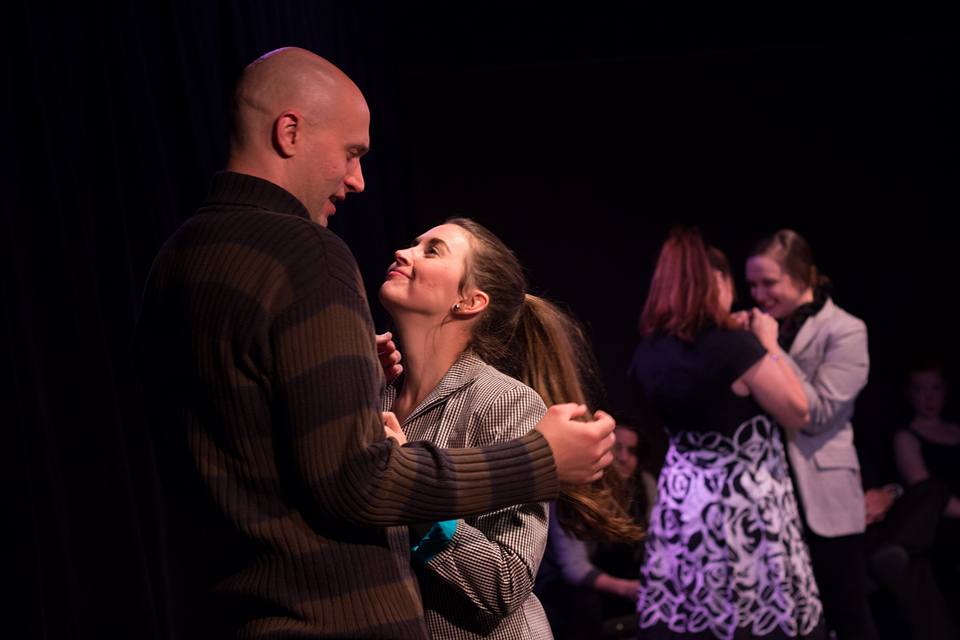
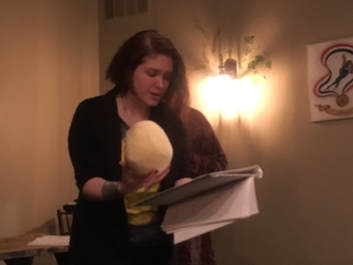
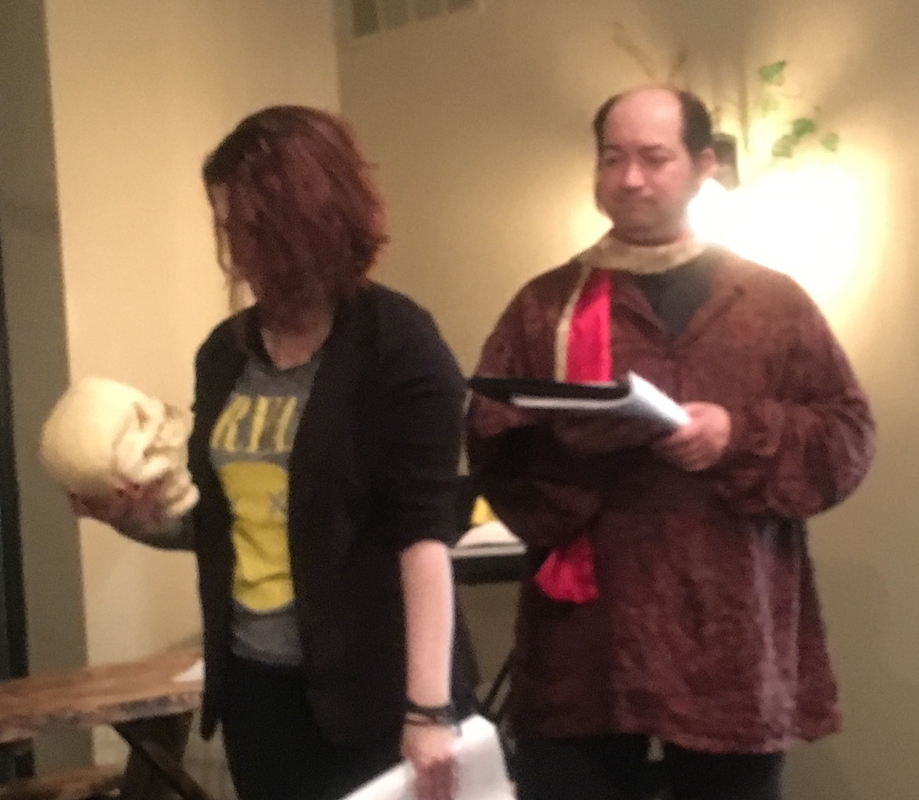
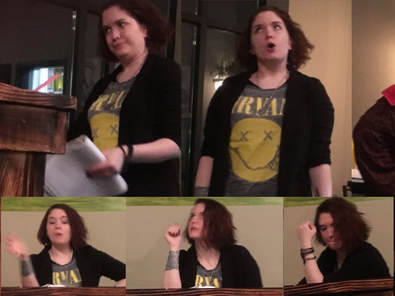
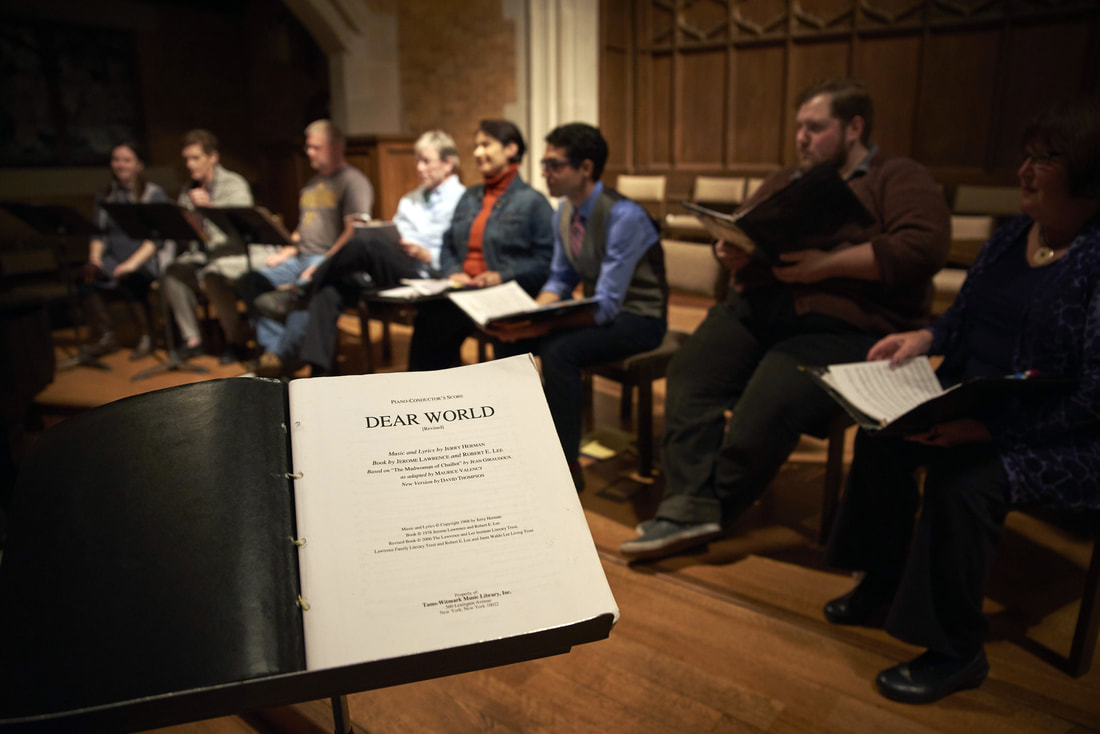
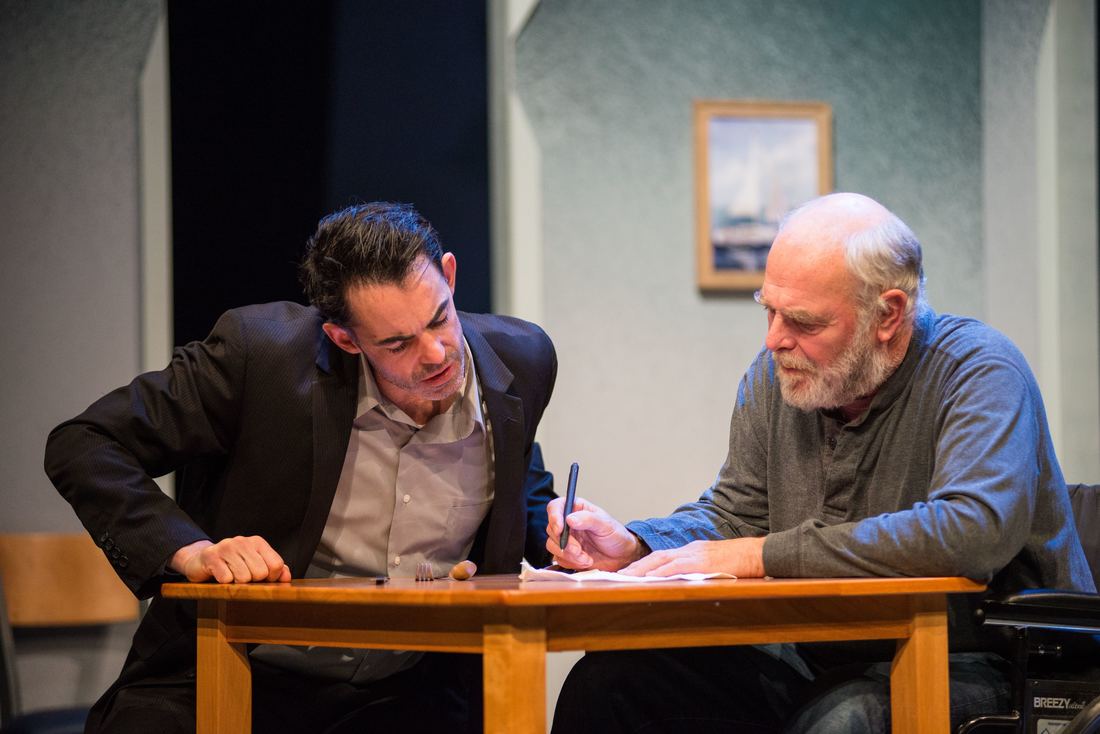
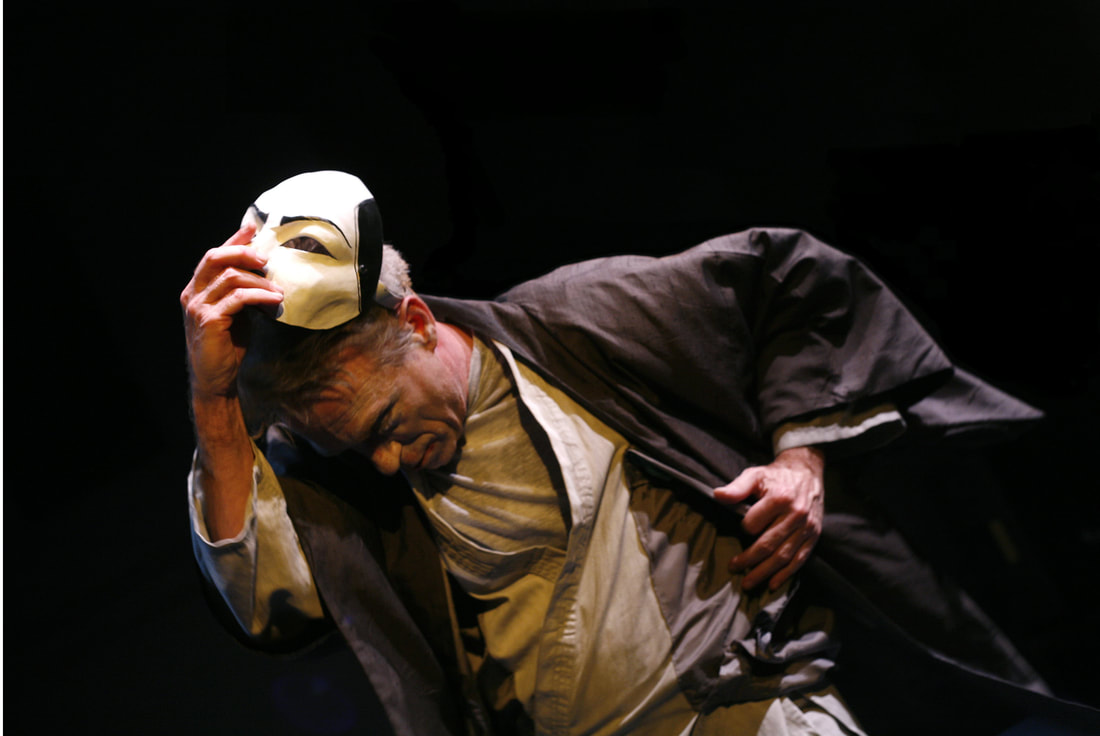
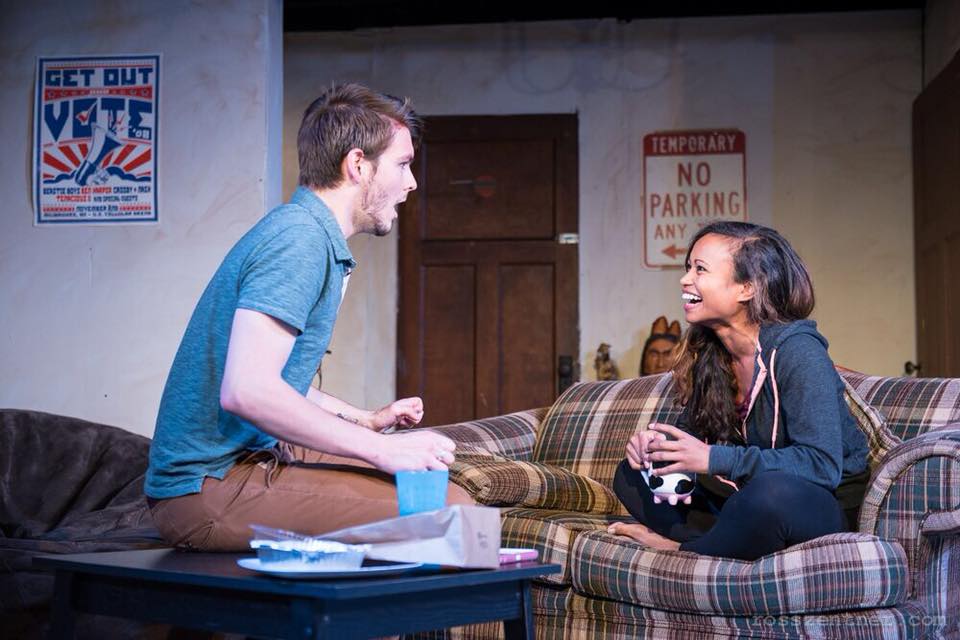
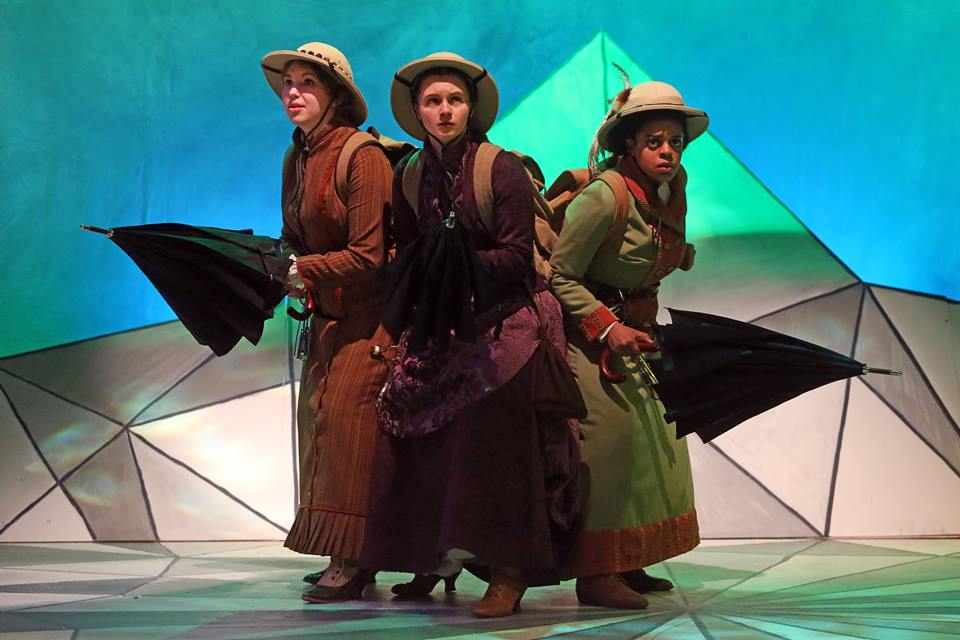

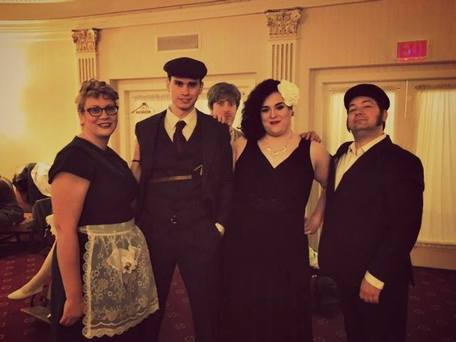
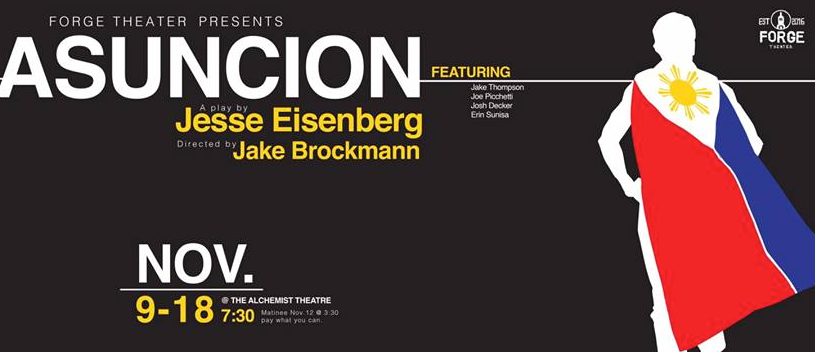
 RSS Feed
RSS Feed
